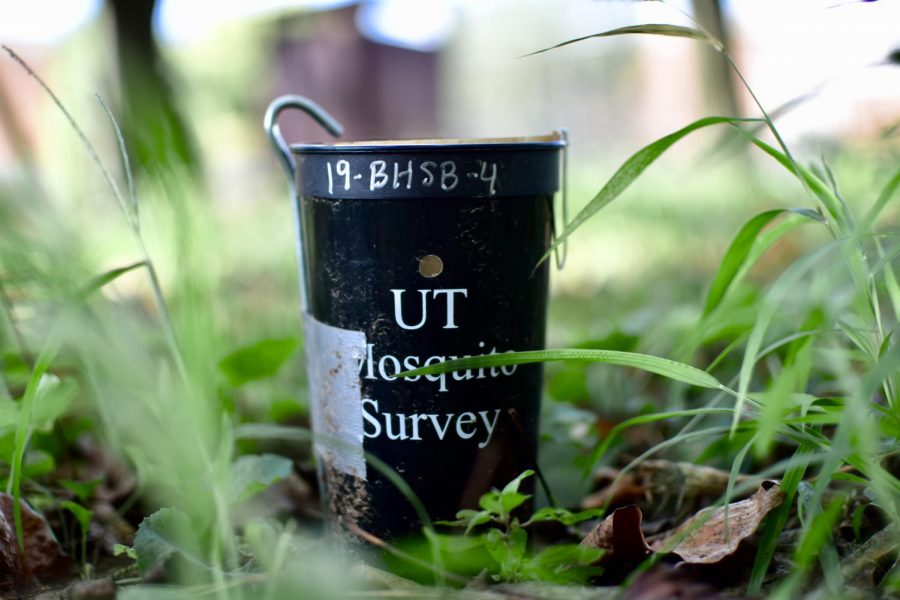Environmental Club, ecology classes participating in UTK mosquito research
Cups like this one are located around campus, and Bearden students are getting hands-on experience in helping UT with its data collection.
September 10, 2019
Walking around Bearden this year, you’re more than likely to spot a flag beside a black cup labeled “UT Mosquito Survey” outside in the grass, which seems out of place on a high school campus.
Bearden’s Environmental Club and ecology classes, however, can shed some light.
Over the summer, while attending a professional development workshop, science teachers Mrs. Tonya Henke and Mrs. Alicia Boris were made aware of a research project run by Dr. Rebecca Trout Fryxell at the University of Tennessee studying an invasive species of mosquito that carries a virus called La Crosse Encephalitis.
“She’s kind of taken this one on because no one else is studying it, and what she’s trying to identify are areas in our surrounding, like Knox County, Sevier County, just our Southern Appalachia area, that has a high population of the type of mosquito,” Mrs. Henke said.
La Crosse Encephalitis is only transferred through a specific type of mosquito, and it can cause cold or flu-like symptoms, making it hard to diagnose.
“The main people it’s affecting are little kids and the elderly,” senior Environmental Club member Claire Blankenship said. “They don’t have the immune systems to fight off the disease, and the problem with the disease is that its difficult to detect.
“It may seem like a headache or an upset stomach, but they’re eventually able to identify that it is La Crosse Encephalitis, but at that point, it’s too late.”
To help spread awareness, Mrs. Henke and Mrs. Boris decided to get their students involved.
“This is [Dr. Trout Fryxell’s] way… to kind of change the world, and that’s what we’re wanting our students to be a part of, to realize that, here they are 16, 17-year-olds, yet they can do the same research that this Ph.D. dedicating her life is doing,” Mrs. Henke said. “They can be part of making this huge change, and that’s what I want to see them to see: how important what they’re doing is.”
The students in Environmental Club and Ecology are responsible for the data collection aspect of the research, which is what the cups around campus are for. After they have what they need, they’ll send them to UT for tests and analysis.
“We decided to go with four cups regarding water and without water and six cups regarding sun and shade, but there are cups with bovine broth in them because it’s supposed to attract the specific mosquito that carries La Crosse or has the potential to carry it,” senior Environmental Club member Gabi Kay said. “We also have paper that’s surrounding the inside of the cup to collect the mosquito eggs, so we’re mostly just doing data collection, and we’ll eventually count them and see which areas are more prone to the mosquitoes.”
Although their cups attract these specific mosquitoes, they pose no serious threat to Bearden students and staff. People on Bearden’s campus are not at any greater risk of encountering one of those mosquitos than they would be in any other part of this area.
The groups’ goals are not only to participate in and contribute to a major research project but also to simply spread awareness of the virus.
“Our research is trying to find where these mosquitoes are located, where they hang around more, so we can get out the awareness to people, especially in Appalachia, who might not have the same resources,” Blankenship said.
Added Mrs. Boris: “Just making them… aware that there is more out there and that there are issues they need to be aware of. …That’s the major thing that I’d like them to get out of it, and more kids are buying into learning about it now that they know that something that’s right here on campus.”
Environmental Club has taken on big projects like this one in the past, such as the Arboretum and cleaning out the green house on campus.
“We just try to do anything we can and just hop on the next big project… [we’re] always trying to do something,” Kay said.
However, they hope to take this project further than others.
“I’m trying to convince a couple of them and [Mrs. Boris] just might even try to get a couple of people from our ecology classes to actually go to a science fair and present their findings,” Mrs. Henke said. “We’re carrying it about as far as we can.
“If they actually take it to the Southern Appalachian science fair, that’s a really big deal.”
